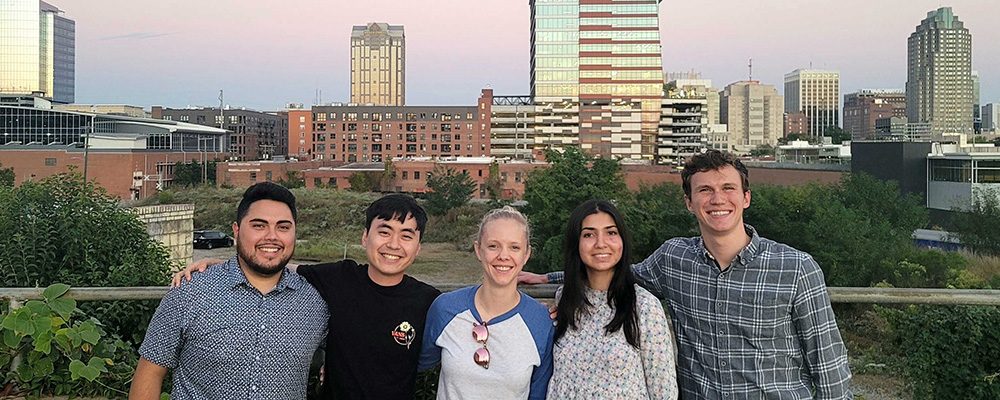Students in the MSA program come from a wide variety of backgrounds. Some start the program with extensive experience in programming and statistics while others join looking to change careers. The diversity of each MSA class is a vital part of how students in the program can learn and grow as data scientists. Each student brings unique strengths to the table while leaning on others to improve on their weaknesses.
As someone who joined the program with a coding background, I was interested in seeing how students from other fields first learned about data science and how their paths to the program differed from my own.

Meet Ike Ingle, Class of ‘22. Ike joined the MSA program after completing his undergraduate degree from UNC Chapel Hill majoring in business. After joining the program, he started a website with a few friends to apply his data science knowledge to fantasy football to help find patterns and identify potential stars of the future. He now works at EY as a Data and Analytics Staff Consultant.
Vinish Kumar: What first piqued your interest in data analytics?
Ike Ingle: What first drew me to data analytics was my lifelong obsession with sports and all the analytics behind them. but what got me interested in the field as a career was taking a Data Science in the Business World class at UNC. That class taught me a lot about how much I could apply analytics to the business field that I wanted to go into after college.
Vinish Kumar: What made you decide to apply to the MSA program specifically?
Ike Ingle: It was an in-state program, which helped with the cost, but more importantly I saw that it was the only analytics program that had a faculty dedicated completely to teaching students in the program and wasn’t part of a computer science, statistics, or business program like at other schools. It also was the first data analytics program in the country and has the largest alumni base, so I knew that meant that it would allow me to network more easily and get a job anywhere. That, along with its reputation across the analytics industry played a huge role in me choosing NC State.
Vinish Kumar: What was the most helpful thing you learned in the program?
Ike Ingle: Aside from anything data science specific, how to work effectively with teams in a fast-paced environment. The IAA is super fast-paced, and everyone has a bunch of different responsibilities. So learning how to manage your time and manage your team’s time to be able to work together and achieve results is probably the most important thing I learned.
Vinish Kumar: What was your favorite part of the program?
Ike Ingle: The practicum project. It was a lot of fun to be able to work through an entire real-world data science project. It was also great to be able to get really close to my team and produce work at the end that we were all really proud of.
Vinish Kumar: Speaking of your practicum, who was your sponsor? What was your role? Was there anything specific from this role that you learned?
Ike Ingle: Terminix. I was my team’s program liaison and social chair. As program liaison, I learned how to balance the requests of my teammates and gauge how the rest of the student body felt so that we could prepare agendas and try to make impactful changes that benefited all of us. As social chair, I learned how to create an atmosphere outside of work so that we could bond and not just spend all of our time working on the practicum.
Vinish Kumar: I know you just started working but how has the program prepared you for the job that you have now?
Ike Ingle: It’s prepared me for the job I have now in a lot of different ways. I’m working with databases and mapping. Without the knowledge I gained from the Institute of how data was structured and how databases worked, I would have no idea what I’m doing. Additionally, consulting is very fast-paced and team-based, so it’s a very similar work environment to the program, where I was always working with different teams on different tasks.
Vinish Kumar: Is there anything you would do differently if you could start the program over?
Ike Ingle: I would have tried to get more involved with social activities and do more events with my classmates outside of the program earlier on so that I could have gotten closer to them earlier in the program rather than later.
Vinish Kumar: How did your background in business help you in being successful in the program?
Ike Ingle: I think it helped me ask the right questions and help guide analysis towards topics that matter from a business perspective instead of just doing analysis and hoping to predict something and not really understanding what the analysis’ intended purpose was and how it can be used to benefit a business.
Vinish Kumar: Is there any advice that you would give students beginning their practicum work?
Ike Ingle: I would say just explore the data as much as possible and try to have a high-level view of what you want to accomplish each sprint before you start. You might not end up reaching those guidelines, but setting a high-level overview of everything you want to accomplish during the first couple of sprints, as well as making sure you split up and understand as much of your data as possible, will help you to have a goal in mind before getting into the real work.
Columnist: Vinish Kumar
